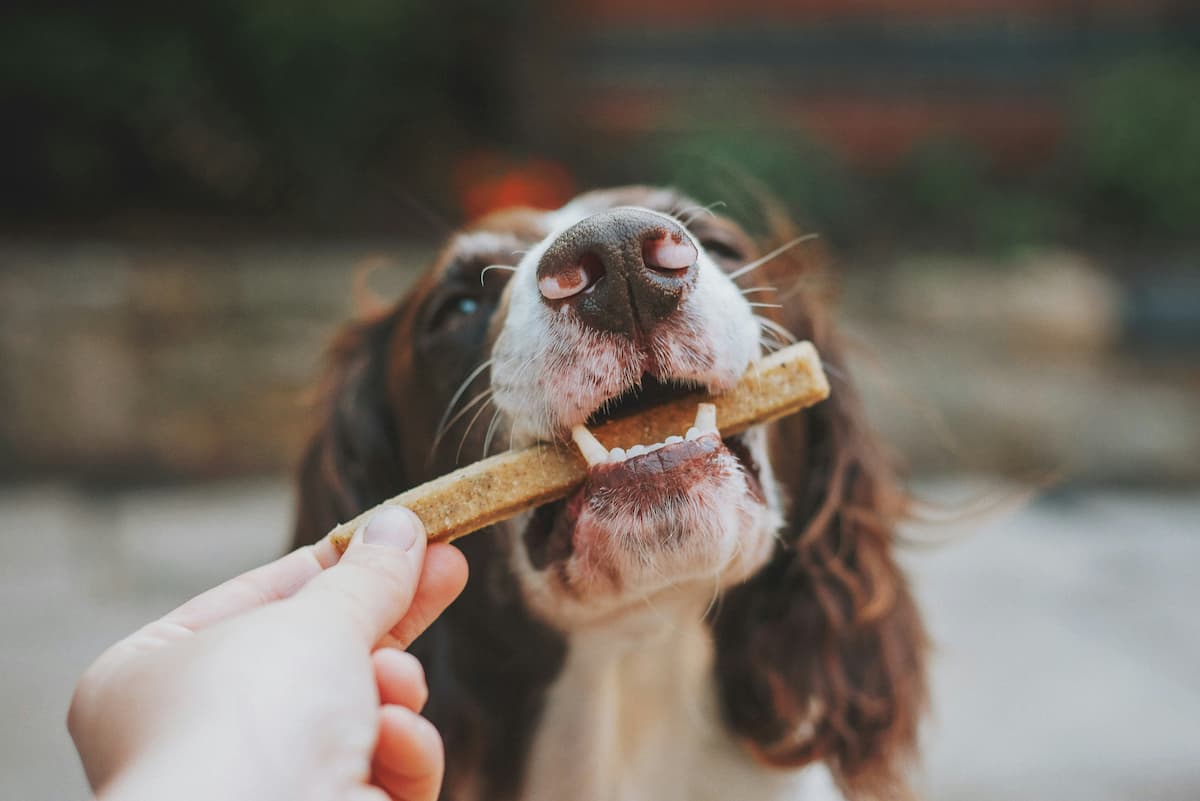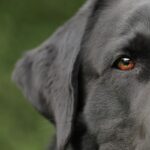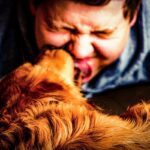Have you ever noticed that some dogs have a peculiar habit of chomping their jaws?
It’s almost as if they’ve discovered a secret game of “impressive dental acrobatics.”
But what’s the reason behind this peculiar behavior?
Read on to have your question answered.
Why is My Dog Chomping Their Jaws?
It’s no surprise that our furry friends do some pretty interesting things from time to time, but have you ever wondered why your dog chomps their jaws?
It might seem like a peculiar behavior, but there are actually a few reasons why dogs engage in this jaw-chomping action:
Anxiety or stress: Dogs, just like humans, can also experience anxiety or stress.
When they are feeling overwhelmed, they may resort to jaw chomping as a way to release tension.
This repetitive motion can provide them with a sense of comfort and serve as a self-soothing mechanism.
If you notice your dog frequently chomping their jaws, it might be worth considering if they are feeling anxious or stressed.
Dental issues: Another potential reason for a dog’s jaw chomping is dental problems.
Dogs may chomp their jaws to alleviate pain or discomfort caused by tooth or gum issues.
Dental diseases such as gum disease, tooth decay, or abscesses can be painful for our canine companions.
If you observe other signs of dental problems, such as bad breath, drooling, or difficulty eating, it’s essential to consult a veterinarian for further evaluation.
Oral fixation or habit: Some dogs have a natural oral fixation, meaning they enjoy using their mouths to explore and interact with the world around them.
Jaw chomping may simply be a habitual behavior for these dogs, similar to how some humans chew on pens or nail-biting.
If your dog’s jaw chomping seems unrelated to anxiety or dental issues and they exhibit no signs of distress, they might engage in this behavior out of habit or for their own amusement.
Addressing Dental Issues as a Potential Cause of Jaw Chomping in Dogs
Dental issues are often overlooked when it comes to understanding why dogs chomp their jaws.
Let’s explore some common dental issues that could be behind your furry friend’s chomping:
1. Tooth Decay: Just like humans, dogs can develop cavities too.
Bacteria and plaque build-up on their teeth can lead to decay, causing pain and inflammation.
When a dog chomps their jaws, it might be their way of trying to relieve the soreness caused by decaying teeth.
Regular dental check-ups and professional cleanings can help prevent this issue.
2. Gum Disease: Gum disease, also known as periodontal disease, is a common condition in dogs.
It occurs when bacteria accumulate along the gum line, leading to inflammation, infection, and even tooth loss.
Dogs may chomp their jaws to try and alleviate the discomfort caused by swollen gums or loose teeth.
Proper dental care, including regular brushing and chew toys, can help prevent gum disease and alleviate your dog’s chomping behavior.
3. Dental Fractures or Infections: Dogs are naturally curious and love to chew on various objects.
Unfortunately, this can sometimes lead to dental fractures or, in severe cases, infections.
A fractured tooth or an infected gum can cause significant pain, prompting dogs to chomp their jaws as an instinctive response.
Regular inspections of your dog’s mouth for any signs of fractures or infections can help address these issues promptly.
Tips for Managing and Reducing Jaw Chomping Behavior in Dogs
Here are some tips for you to manage your dog’s jaw chomping behavior.
If your furry friend shows signs of anxiety or stress such as pacing, panting, or excessive barking, it’s essential to address the underlying cause and provide them with a safe and secure environment.
Consider implementing relaxation techniques, providing mental stimulation, or considering professional help from a dog behaviorist.
Additionally, jaw chomping can also be a sign of teething in puppies.
Just like human babies, puppies go through a teething phase where their baby teeth are replaced by their adult teeth.
During this time, they may experience discomfort and itching in their gums, leading to excessive chewing and jaw chomping.
Providing appropriate chew toys, frozen carrots, or ice cubes can help soothe their sore gums and redirect their chewing urges.
Remember, every dog is unique, and their reasons for engaging in jaw chomping behavior may vary.
It’s important to observe your dog’s overall behavior, consult with a veterinarian if needed, and try different strategies to manage and reduce this behavior.
With patience, understanding, and proper care, you can help your furry friend lead a happier and healthier life while minimizing jaw chomping tendencies.
When to Seek Professional Help for Your Dog’s Excessive Jaw Chomping
1. Dental problems: If you notice your furry friend consistently chomping their jaws, it’s worth checking their teeth and gums for any signs of trouble, such as redness, swelling, or even a broken tooth.
A visit to the vet for a thorough dental examination may be necessary.
2. Stress and anxiety: Excessive jaw chomping can be a sign of a stressed or anxious dog.
It may occur in situations that cause fear or discomfort, such as thunderstorms, fireworks, or when they are separated from their loved ones.
If your dog displays other signs of stress, such as excessive panting, pacing, or hiding, it may be time to consult a professional to help your pup manage their anxiety and provide them with the support they need.
3. Medical conditions: In some cases, excessive jaw chomping may be a symptom of an underlying medical condition.
Temporomandibular joint disorder (TMJ) or other jaw-related issues can cause discomfort and lead to increased jaw chomping.
Additionally, certain neurological conditions or pain in other parts of the body can manifest as excessive jaw movements.
If you have ruled out dental problems and your dog’s behavior persists, it is essential to seek the advice of a veterinarian who can conduct further examinations and tests to determine the root cause of your pup’s jaw chomping.
Remember, each dog is unique, and the reasons for excessive jaw chomping can vary.
It’s crucial to closely observe your furry friend and take note of any accompanying symptoms to provide accurate information to your veterinarian.
Seeking professional help will ensure that any underlying causes are addressed, and your beloved pet receives the necessary care and treatment for a happy and healthy life.
FAQ
Q: What exactly does it mean when dogs chomp their jaws?
A: When we mention jaw chomping in dogs, we’re referring to that repetitive movement where they open and close their mouths in a quick, rhythmic manner, often making a clicking sound.
It’s almost as if they’re snapping at something invisible!
Q: Is this behavior common among all dogs?
A: Absolutely!
Dogs of all breeds, shapes, and sizes can exhibit jaw chomping behavior.
It’s not something exclusive to particular breeds or age groups.
Your furry companion might be a proud member of the jaw-chomping club.
Q: So, what triggers dogs to start chomping their jaws?
A: While it’s difficult to pinpoint a single cause, there are several reasons why dogs may chomp their jaws.
First, chewing and biting is intrinsic to their nature.
Dogs are known for exploring their surroundings with their mouths.
Chomping can be their way of engaging those jaw muscles, which helps them relieve stress or simply keep occupied.
Q: Can certain health issues be causing this behavior?
A: Yes, indeed!
It’s crucial to remember that jaw chomping behavior can also stem from health concerns.
Dental issues like tooth pain or gum infections may cause dogs to chomp their jaws as a form of self-soothing or to alleviate discomfort.
If you notice any other worrying signs, such as excessive drooling, difficulty eating, or bad breath, it’s wise to consult your veterinarian.
Q: Are there any other reasons dogs might chomp their jaws?
A: Absolutely!
Another common trigger for jaw chomping in dogs is anxiety or nervousness.
Just like humans may find themselves biting their nails or tapping their feet when feeling uneasy, dogs resort to chomping their jaws to comfort themselves in stressful situations.
It’s their way of coping with the emotions bubbling up inside.
Q: Is there anything we can do to help dogs who chomp their jaws?
A: Of course!
If you suspect your dog’s jaw chomping is related to dental problems, it’s essential to get them a thorough dental check-up.
Your vet will be able to identify any issues and recommend treatment options.
For anxiety-related chomping, you can provide comforting items such as chew toys or invest in calming techniques like gentle massages or aromatherapy.
Creating a safe and peaceful environment will go a long way in easing their stress.
Q: Is there ever a time when jaw chomping becomes problematic?
A: While occasional jaw chomping is usually harmless, it could become a cause for concern if it becomes compulsive or if other concerning symptoms arise.
If your dog’s chomping is excessive, consistent, or if it starts interfering with their daily activities, it’s important to have them evaluated by a professional to rule out any underlying health conditions.
Q: So, jaw chomping is normal, but when is it not normal?
A: Great question!
It’s always good to keep an eye out for any sudden, unusual changes in your dog’s behavior.
If your furry friend starts chomping their jaws excessively or persistently, it may be a sign of an underlying issue requiring attention.
Monitoring changes in behavior and seeking veterinary advice promptly can help ensure your dog’s well-being.
Remember, every dog is unique, and behaviors may vary.
Understanding the reasons behind jaw chomping can help us recognize when it’s just a quirky habit or a sign of something needing our attention.
So, let’s keep a watchful eye on our canine companions and give them the love and care they deserve!
The Farewell Notes
So there you have it, folks!
Now you know why your furry friend sometimes chomps their jaws.
It turns out, there are several factors at play, from their natural instincts and communication methods to possible health issues or behavioral quirks.
But don’t fret!
Most of the time, it’s just their way of letting you know they’re happy and content, or they’re simply exploring their surroundings.
Remember, understanding your pup’s body language goes a long way in building a strong bond with them.
Next time you catch your pooch chomping away, take a moment to assess the situation.
Notice their environment and the context in which they’re chomping, and consider if there might be an underlying reason behind their behavior.
Remember, every dog is unique, so what applies to one may not apply to another.














